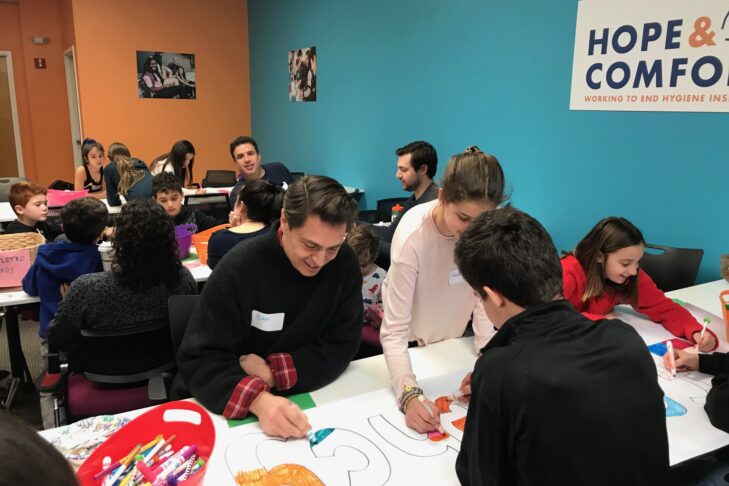Built into Jewish tradition is the imperative to seek out justice and help the oppressed. Perhaps the best-known story of our people portrays us as slaves in Egypt yearning to be free. We were living in a land where our human rights and dignity were negated. We were slaves to a pharaoh who didn’t know who we were and who took away our freedom. From that experience, we are not taught to be bitter or defensive; rather, our tradition responds to this injustice by saying: “You should love the stranger as yourself, because you were strangers in the Land of Egypt” (Leviticus 19:34). From hate, we are taught to love. From cruelty, we are taught to seek justice.
On Martin Luther King Jr. Day, many schools around the country and in our neighborhoods were closed and children were out of school. Hundreds, if not thousands of people, volunteered in honor of Dr. King’s legacy, making it a day “on” instead of a day off.
At The Rashi School, students and their families volunteered at three local charities: Cradles to Crayons, where they sorted and put together children’s clothes, shoes, books, toys, etc., for children 0-15 years old; Hope and Comfort, where they assembled personal hygiene kits for children, teens and young adults; and Many Helping Hands 365, where volunteers created activity kits for children in hospital emergency rooms, made Valentine’s Day cards for veterans and senior citizens who are homebound and created fleece blankets and scarves for homeless children, teens and adults. These families took Dr. King’s message of equality for all to heart as they celebrated his birthday.
So, now what? Now that Martin Luther King Jr. Day is over, what is the responsibility to ourselves, our children and our country in terms of helping to build on his legacy? I would suggest that the message of fighting for equality and fairness isn’t over; it is just beginning. MLK Day isn’t meant to be one day of activism, rather an instigator to build a dedication to action. Celebrating Dr. King’s legacy (and the legacy of so many others who fought for change) is not just about marking a day but cultivating a way of living and viewing the world.
How do we do this in families with children?
Volunteer: All of the worthy organizations that brought people together on MLK Day need help all year long. Find an organization that is working to create equity and justice and give of your time. The Jewish Community Relations Council this year offered volunteer opportunities for over 600 people with 15 partner organizations for its annual MLK Day of Service. These organizations need help year-round. In honor of Martin Luther King Jr., volunteer four times a year.
Educate: Reading books at home is common in so many households. Being able to teach children about values you care about through this daily ritual gives children vocabulary and ideas that extend beyond bedtime. Books about different people teach children about a world beyond their home and neighborhood. Books about different historical time periods teach children about change and evolution. These books can be conversation starters for families about topics they care about. Perhaps some of the books PJ Library has chosen could be a starting point for addressing topics of fairness. In honor of Martin Luther King Jr., read one book a month about a group that deserves to be recognized and lifted up.
Share what is happening in the world: Some people would say that Dr. King’s message is more important today than it has been in a long time. With the rise of violence and rhetoric against minority groups, we need to double our efforts to educate and teach that differences are meant to be embraced and celebrated. Talk to your children in age-appropriate ways about discrimination that still exists in the world. Let them know that prejudice and racism still exist and that it is important for them to fight against it in small and large ways. Let them know that Jews have been on the forefront of combating discrimination and that they are part of this tradition. Use resources from organizations like the Anti-Defamation League to have these difficult conversations. In honor of Martin Luther King Jr., talk about issues of inequality that still plague our world.
The ancient rabbis teach that every word of Torah is said for a reason and that none is superfluous. When we are taught, “Justice, justice shall you pursue,” they ask the question about why “justice” is listed twice. I would like to propose that it is because the work of creating justice in our world is both an ancient charge and one that is imperative today. It is demanding us to think about the message set forward by Dr. King on his birthday and beyond. It is a message for adults today and for the children they are raising. “Justice, justice shall you pursue” is our command for making the world more fair and just today and beyond.
This post has been contributed by a third party. The opinions, facts and any media content are presented solely by the author, and JewishBoston assumes no responsibility for them. Want to add your voice to the conversation? Publish your own post here. MORE



